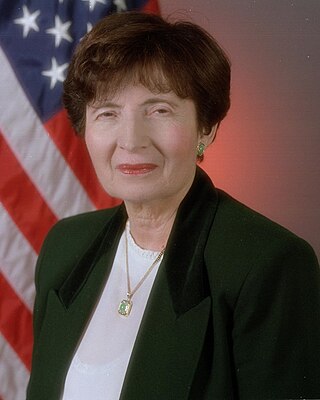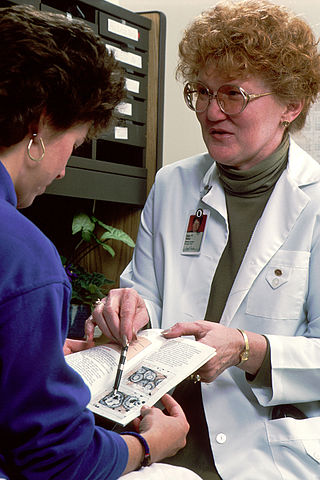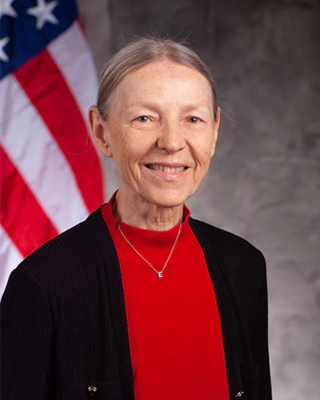Related Research Articles

Hildegard E. Peplau was an American nurse and the first published nursing theorist since Florence Nightingale. She created the middle-range nursing theory of interpersonal relations, which helped to revolutionize the scholarly work of nurses. As a primary contributor to mental health law reform, she led the way towards humane treatment of patients with behavior and personality disorders.
Nurse education consists of the theoretical and practical training provided to nurses with the purpose to prepare them for their duties as nursing care professionals. This education is provided to student nurses by experienced nurses and other medical professionals who have qualified or experienced for educational tasks, traditionally in a type of professional school known as a nursing school or college of nursing. Most countries offer nurse education courses that can be relevant to general nursing or to specialized areas including mental health nursing, pediatric nursing, and post-operative nursing. Nurse education also provides post-qualification courses in specialist subjects within nursing.
Psychiatric nursing or mental health nursing is the appointed position of a nurse that specialises in mental health, and cares for people of all ages experiencing mental illnesses or distress. These include: neurodevelopmental disorders, schizophrenia, schizoaffective disorder, mood disorders, addiction, anxiety disorders, personality disorders, eating disorders, suicidal thoughts, psychosis, paranoia, and self-harm.
Nursing assessment is the gathering of information about a patient's physiological, psychological, sociological, and spiritual status by a licensed Registered Nurse. Nursing assessment is the first step in the nursing process. A section of the nursing assessment may be delegated to certified nurses aides. Vitals and EKG's may be delegated to certified nurses aides or nursing techs. It differs from a medical diagnosis. In some instances, the nursing assessment is very broad in scope and in other cases it may focus on one body system or mental health. Nursing assessment is used to identify current and future patient care needs. It incorporates the recognition of normal versus abnormal body physiology. Prompt recognition of pertinent changes along with the skill of critical thinking allows the nurse to identify and prioritize appropriate interventions. An assessment format may already be in place to be used at specific facilities and in specific circumstances.

Faye Glenn Abdellah was an American pioneer in nursing research. Abdellah was the first nurse and woman to serve as the Deputy Surgeon General of the United States. Preceding her appointment, she served in active duty during the Korean War, where she earned a distinguished ranking equivalent to a Navy Rear Admiral, making her the highest-ranked woman and nurse in the Federal Nursing Services at the time. In addition to these achievements, Abdellah led the formation of the National Institute of Nursing Research at the NIH, and was the founder and first dean of the Graduate School of Nursing at the Uniformed Services University of the Health Sciences (USUHS). A few of Abdellah's more passionate interests in public health included the importance of long-term care planning for elderly patients; the need to strengthen nursing school infrastructure; and the necessity of patient-centered approaches in nursing. In 2000, Abdellah was inducted into the National Women's Hall of Fame. During her acceptance speech, Abdellah made the following quote: "We cannot wait for the world to change. .. Those of us with intelligence, purpose, and vision must take the lead and change the world. .. I promise never to rest until my work has been completed!”

The nurse–client relationship is an interaction between a nurse and "client" (patient) aimed at enhancing the well-being of the client, who may be an individual, a family, a group, or a community.
In the United States, a psychiatric-mental health nurse practitioner (PMHNP) is an advanced practice registered nurse trained to provide a wide range of mental health services to patients and families in a variety of settings. PMHNPs diagnose, conduct therapy, and prescribe medications for patients who have psychiatric disorders, medical organic brain disorders or substance abuse problems. They are licensed to provide emergency psychiatric services, psychosocial and physical assessments of their patients, treatment plans, and manage patient care. They may also serve as consultants or as educators for families and staff. The PMHNP has a focus on psychiatric diagnosis, including the differential diagnosis of medical disorders with psychiatric symptoms, and on medication treatment for psychiatric disorders.
Annie Therese Altschul, CBE, BA, MSc, RGN, RMN, RNT, FRCN was Britain's first mental health nurse pioneer; a midwife, researcher, educator, author and a patient advocate, emeritus professor of nursing.

The Cassel Hospital is a psychiatric facility in a Grade II listed building at 1 Ham Common, Richmond, Ham in the London Borough of Richmond upon Thames. It is run by the West London NHS Trust.

Holistic nursing is a way of treating and taking care of the patient as a whole body, which involves physical, social, environmental, psychological, cultural and religious factors. There are many theories that support the importance of nurses approaching the patient holistically and education on this is there to support the goal of holistic nursing. The important skill to be used in holistic nursing would be communicating skills with patients and other practitioners. This emphasizes that patients being treated would be treated not only in their body but also their mind and spirit.. Holistic nursing is a nursing speciality concerning the integration of one's mind, body, and spirit with his or her environment. This speciality has a theoretical basis in a few grand nursing theories, most notably the science of unitary human beings, as published by Martha E. Rogers in An Introduction to the Theoretical Basis of Nursing, and the mid-range theory Empowered Holistic Nursing Education, as published by Dr. Katie Love. Holistic nursing has gained recognition by the American Nurses Association (ANA) as a nursing specialty with a defined scope of practice and standards. Holistic nursing focuses on the mind, body, and spirit working together as a whole and how spiritual awareness in nursing can help heal illness. Holistic medicine focuses on maintaining optimum well-being and preventing rather than just treating disease.
Forensic nursing is the application of the forensic aspects of healthcare combined with the bio/psycho/social/spiritual education of the registered nurse in the scientific investigation and treatment of trauma and/or death of victims and perpetrators of violence, criminal activity, and traumatic accidents In short, forensic nursing is the care of patients intersecting with the legal system. Sexual assault perpetrated against girls and women is a pervasive problem globally and has been associated with a range of adverse mental and physical health outcomes for survivors. This includes post-traumatic stress disorder (PTSD), depression, substance use, anxiety, suicidality, and negative reproductive health outcomes.. Survivors of SA bear the burden of both acute and long-lasting sequelae, including injuries, sexually transmitted diseases, and an increased risk of chronic physical and mental health problems.
A mental health nurse (MHN) refers to a nurse in the UK, who specializes in the care of patients with mental health issues. The practice of MHNs is called mental health nursing.
Linda H. Aiken, is an American nurse and researcher who is currently the Founding Director for the Center for Health Outcomes and Policy Research and a Senior Fellow of the Leonard Davis Institute for Health Economics. She also is the Claire M. Fagin Leadership Professor of Nursing Science and a professor of Sociology at the University of Pennsylvania, Philadelphia.

Eileen Skellern FRCN (1923–1980) was an English psychiatric nurse who was involved in pioneering psychosocial and psychotherapeutic methods for treating patients. She helped open up new roles for nurses in mental health work, and demonstrated that they could be equal partners in a team, taking personal responsibility for patient care while collaborating with doctors and playing an important part in new developments in therapeutic treatment. While also taking a lead in education, administration and policy development, she did research and published in medical and nursing journals, and was a member of key committees in her field.
Carol Fowler Durham is an American Clinical Professor of Nursing and Doctor of Education who is known as a leader in the fields of Healthcare Quality and Safety, nursing education, interprofessional education, and medical simulation.
Mary Starke Harper was an African American nurse who worked in bedside nursing, nurse research and health policy. She spent several years working for the Department of Veterans Affairs. She performed clinical research on the geriatric psychiatric population and minority health. In 1972, Harper created the NIMH Minority Fellowship Program. She served on four presidential administration advisory panels with regards to mental health and health care reform. She died in 2006 as the recipient of several honors and author of over 180 publications.
Patricia M. Davidson is an Australian nursing educator. She is best known for her contributions improving cardiac nursing and transitional care with a focus on under served populations in a global context, and for her leadership in higher education.

The Journal of Psychosocial Nursing and Mental Health Services is a monthly peer-reviewed nursing journal for psychosocial and mental health nurses. It includes sections on psychopharmacology, mental health care of older adults, addictive behaviors and diagnoses, and child/adolescent disorders and issues. The editor-in-chief is Mona Shattell. The journal was established in 1963 and published bimonthly. In 1978, the publication frequency increased to monthly.
Erla Kolbrún Svavarsdóttir is a Professor in the School of Health Sciences within the Faculty of Nursing at the University of Iceland and Director of the family nursing section in a connected position at Landspítali University Hospital. Erla Kolbrún has for decades placed an emphasis on development of teaching in family nursing, in addition to developing and testing measuring instruments and therapeutic research in the field of family nursing and researching violence in intimate relationships and adaptation of individuals and family members to acute or long-term physical and mental illnesses/disorders.

Elaine Lucille Larson is an American infectious disease specialist. As a Professor of Epidemiology at the Columbia University Mailman School of Public Health, she has published four books and more than four hundred articles on the subjects of infection prevention and control, disease epidemiology, and related issues. In 2017, Larson was named a "Living Legend" by the American Academy of Nursing, the Academy's highest honor.
References
- ↑ Heist, Lauren (2015-02-19). "Turning Point Behavioral Health Care Center Announces New Board Members". Chicago Tribune. Retrieved 2018-09-16.
- ↑ Kahanar, Larry (2016-04-22). "Underreported: Drivers not seeking help for mental health issues". Fleet Owner. Retrieved 2018-09-16.
- ↑ Lauterbach, Cole (2017-10-11). "Study: Illinois patients use medical marijuana as an alternative to opioids". Chicago Tribune. Retrieved 2018-09-16.
- ↑ Kress, Danielle (2019-01-29). "The Johns Hopkins University School of Nursing Appoints Inaugural Position to Bolster Faculty Development". Johns Hopkins University. Retrieved 2019-10-25.
- ↑ Strickland, Anais (2017-04-14). "Appointments, Resignations, Deaths (4/14/2017)". The Chronicle of Higher Education. Retrieved 2018-09-16.
- ↑ Strickland, Anais (2017-04-14). "Appointments, Resignations, Deaths (4/14/2017)". The Chronicle of Higher Education. Retrieved 2018-09-16.
- ↑ Butje, Andrea; Repede, Elizabeth; Shattell, Mona M. (1 October 2008). "Healing Scents" (PDF). Journal of Psychosocial Nursing and Mental Health Services. 46 (10): 46–52. doi:10.3928/02793695-20081001-12. PMID 18935936.
- 1 2 3 Shattell, Mona M; Starr, Sharon S; Thomas, Sandra P (2007). "'Take my hand, help me out': Mental health service recipients' experience of the therapeutic relationship" (PDF). International Journal of Mental Health Nursing. 16 (4): 274–84. doi:10.1111/j.1447-0349.2007.00477.x. PMID 17635627.
- ↑ Balay, Anne (2016-03-09). "Long-Haul Sweatshops". New York Times. Retrieved 2018-09-16.
- ↑ Balay, Anne (2016-03-22). "PTSD in the Driver's Seat". The Atlantic. Retrieved 2018-09-16.
- ↑ Shattell, Mona (2018-04-30). "Gun rights – Constitution needs to be amended to protect the lives of our patients". The Hill. Retrieved 2018-09-16.
- ↑ Shattell, Mona (2012-12-12). "When the Most Trusted Profession Falls Prey". Huffington Post. Retrieved 2012-09-15.